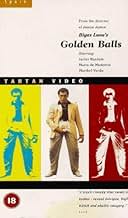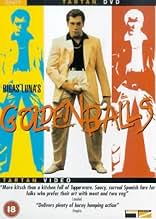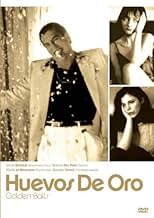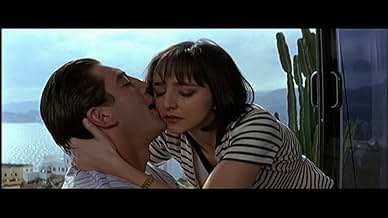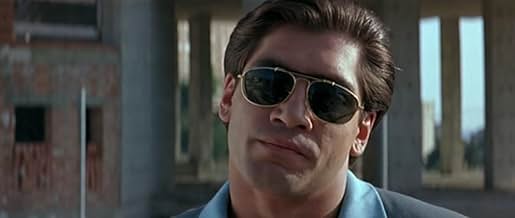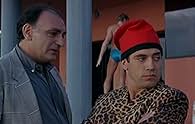VALUTAZIONE IMDb
6,1/10
4060
LA TUA VALUTAZIONE
Aggiungi una trama nella tua linguaA construction worker uses his charm and bravado in an attempt to attain enough finances to build his dream project.A construction worker uses his charm and bravado in an attempt to attain enough finances to build his dream project.A construction worker uses his charm and bravado in an attempt to attain enough finances to build his dream project.
- Premi
- 4 vittorie e 3 candidature totali
Alessandro Gassmann
- El amigo de Melilla
- (as Alessandro Gassman)
Benicio Del Toro
- El amigo de Miami
- (as Benisio Del Toro)
Francesco Maria Dominedò
- El Mosca
- (as Francesco Mª Dominedo)
Francisco Casares
- El productor
- (as Paco Casares)
Recensioni in evidenza
Bigas Luna's 1993 film HUEVOS DE ORO ("Golden Balls/Eggs", a title punning on both the goose that laid the golden eggs and a tough guy's balls of steel) depicts the rise and fall of Benito Gonzalez (Javier Bardem), a young Spanish construction worker who becomes an affluent real estate developer on the Mediterranean coast.
After being jilted by his first girlfriend (Elisa Tovati), who leaves him for his best friend, Benito develops a mania for building the tallest building in Benidorm, which may be seen as little more than an enormous phallic symbol flaunting his manhood. Obsessed with this big construction project, his lust for his next woman, Claudia (Maribel Verdú) takes second place to having her sleep with potential investors to win them over. Benito then marries a banker's daughter, Marta (Maria de Medeiros) to have access to her father's funds. Benito lives a life of sexual excess and enormous consumption of food, especially the Alicante sweet known as torron. Like some of the work of Almodovar, Bigas Luna clearly likes riffing on Spanish stereotypes and regional differences.
Ultimately, however, Benito's hubris leads to his downfall. This protagonist is certainly an odious guy, but -- though I won't spoil the ending -- the depths to which he is ultimately sunk inspire a perverse sympathy in the viewer. Years went by between my first viewing of this film and the second, but in the interim I would often look back on this film's plot and ending scenes, thinking of how sad it was to lose everything and end up that way.
HUEVOS DE ORO isn't an especially deep film, but that dramatic arc, hewing very close to classical notions of tragedy, is impressive and I'd say this film is worth a watch.
After being jilted by his first girlfriend (Elisa Tovati), who leaves him for his best friend, Benito develops a mania for building the tallest building in Benidorm, which may be seen as little more than an enormous phallic symbol flaunting his manhood. Obsessed with this big construction project, his lust for his next woman, Claudia (Maribel Verdú) takes second place to having her sleep with potential investors to win them over. Benito then marries a banker's daughter, Marta (Maria de Medeiros) to have access to her father's funds. Benito lives a life of sexual excess and enormous consumption of food, especially the Alicante sweet known as torron. Like some of the work of Almodovar, Bigas Luna clearly likes riffing on Spanish stereotypes and regional differences.
Ultimately, however, Benito's hubris leads to his downfall. This protagonist is certainly an odious guy, but -- though I won't spoil the ending -- the depths to which he is ultimately sunk inspire a perverse sympathy in the viewer. Years went by between my first viewing of this film and the second, but in the interim I would often look back on this film's plot and ending scenes, thinking of how sad it was to lose everything and end up that way.
HUEVOS DE ORO isn't an especially deep film, but that dramatic arc, hewing very close to classical notions of tragedy, is impressive and I'd say this film is worth a watch.
This is a generally enjoyable send-up of the excesses of the 1980's:- the get-rich quick, looking after no. 1 culture which prevailed for a mercifully brief period. The anti-hero is a cynical building contractor who will do anything to achieve his aim of making a fortune out of nothing, regardless of the law or of any loyalty to those closest to him. Needless to say, he gets his come-uppance and the final scene in which he smashes a lavatory to pieces is vintage Bigas Luna.
Unfortunately, it doesn't quite manage to keep up the same pace as "Jamon Jamon" and, particularly after about half way through, it starts to lose its momentum and the viewer starts to lose interest. But there are one or two scenes which are so funny that they alone make the film worth seeing, e.g. the three-in-a-bed scene in which he suddenly realises that he is not the fantastic lover he had always imagined he was.
Unfortunately, it doesn't quite manage to keep up the same pace as "Jamon Jamon" and, particularly after about half way through, it starts to lose its momentum and the viewer starts to lose interest. But there are one or two scenes which are so funny that they alone make the film worth seeing, e.g. the three-in-a-bed scene in which he suddenly realises that he is not the fantastic lover he had always imagined he was.
With some films it is really hard to tell for whom they were made. Huevos de oro seems to aim at the well educated Spanish middle class. There must be many inside jokes in this movie which you will not understand if you are an outsider. This can be pretty annoying.
Symbols and references to art and popular culture abound, the movie alludes to the work of Salvador Dalí, Luis Buñuel and the Surrealists in general, a certain infatuation with bidet baths seems to point to Duchamp's ready mades. What's more, the main character has also a knack for karaoke tapes with songs of Julio Iglesias. But why all this is mixed together in a rather pretty but also gratuitous way simply eludes me. I can only guess that it all serves to highlight the vital, impetuous, boorish vulgarity of the main character who the director seems to admire and despise at the same time. How all the really pretty women run after him (the main character, I mean) is slightly disconcerting.
The movie has three parts. It starts in the Spanish enclave of Melilla in Africa, where Benito, the main character, does his military service, apparently in the corps of engineers. Then it moves on to the resort town of Benidorm in Spanin where Benito just wants to build the highest skyscraper of the place and become a vulgarized Howard Roark. For the last part a defeated Benito moves to Miami, Florida, presumably in order to start a new life". But the change of places is not really explained satisfactorily. It is also somehow irritating that there is no character development and that the movie descends into a soap opera modus without being convincingly ironic. It must be said that Javier Bardem acquits himself very well playing the young stud who grows limp and deflated.
I purchased this movie because I am interested in townscapes. And Benidorm is a kind of a special place, townscapewise. In this aspect Huevos de oro satisfied me only partially. In Jess Franco's She Killed In Ecstasy (1970) this specific location was used in a more rewarding way.
Symbols and references to art and popular culture abound, the movie alludes to the work of Salvador Dalí, Luis Buñuel and the Surrealists in general, a certain infatuation with bidet baths seems to point to Duchamp's ready mades. What's more, the main character has also a knack for karaoke tapes with songs of Julio Iglesias. But why all this is mixed together in a rather pretty but also gratuitous way simply eludes me. I can only guess that it all serves to highlight the vital, impetuous, boorish vulgarity of the main character who the director seems to admire and despise at the same time. How all the really pretty women run after him (the main character, I mean) is slightly disconcerting.
The movie has three parts. It starts in the Spanish enclave of Melilla in Africa, where Benito, the main character, does his military service, apparently in the corps of engineers. Then it moves on to the resort town of Benidorm in Spanin where Benito just wants to build the highest skyscraper of the place and become a vulgarized Howard Roark. For the last part a defeated Benito moves to Miami, Florida, presumably in order to start a new life". But the change of places is not really explained satisfactorily. It is also somehow irritating that there is no character development and that the movie descends into a soap opera modus without being convincingly ironic. It must be said that Javier Bardem acquits himself very well playing the young stud who grows limp and deflated.
I purchased this movie because I am interested in townscapes. And Benidorm is a kind of a special place, townscapewise. In this aspect Huevos de oro satisfied me only partially. In Jess Franco's She Killed In Ecstasy (1970) this specific location was used in a more rewarding way.
Lots of rather drrunken partying and explicit sexual activity do not disguise the fact that Golden Balls tells a sad story. Bardem, as Benito the young construction worker consumed with ambitions, aspiration, and sexual desire, is very fine. I would give him most of the credit for making this an interesting film, but Bigas Luna, the director, shows great skill in his handling of Benito's tangled relationships with three women and his slick maneuvering to gain financing for his consuming desire to build the tallest skyscraper in the city. Benito scores success in business and with his women, but in the end meets his downfall, losing money and prestige as his shoddy building practices are exposed. Even worse, it is made clear to him that he is not as good in bed as his gardener, Bob, played by Benicio del Toro in what is little more than a cameo but very convincing.
Bigas Luna's film is far from perfect, but I found it a sharp and caustic portrait of a particular lifestyle and a particular time and place in recent Spanish history - the 80's construction boom, the new rich and their unabashed cheesiness, the macho ibérico...Bardem's character is spot on, and he plays the role incredibly well. In fact, all of the performances are very good; it is the directing that occasionally fails the story. It does at times feel like the sex scenes outweigh all others, but I don't feel that they are gratuitous. Other than expensive accessories and a lust for skyscrapers, it is what Bardem's character spends most of his time and energy on. Maria de Medeiros and Maribel Verdú are excellent, especially the latter, who delivers a pretty brave performance. The cinematography is really beautiful and well conceived for each stage of the story. And it contains what must be one of my favorite cinematic moments in a long time...Bardem doing a Julio Iglesias karaoke number in a leopard-print robe, black speedo and Catalan barretina.
Lo sapevi?
- QuizSecond part of Bigas Luna's "Iberian Trilogy" also including Prosciutto prosciutto (1992) and La teta y la luna (1994).
- ConnessioniReferenced in Two Girls and a Guy (1997)
- Colonne sonoreHuevos de oro
(Theme)
By Nicola Piovani
Performed by the Orchestra dell'Unione Musicisti di Roma
Directed by Nicola Piovani
Violoncello soloist: Francesca Taviani
I più visti
Accedi per valutare e creare un elenco di titoli salvati per ottenere consigli personalizzati
- How long is Golden Balls?Powered by Alexa
Dettagli
- Data di uscita
- Paesi di origine
- Sito ufficiale
- Lingua
- Celebre anche come
- Golden Balls
- Luoghi delle riprese
- Villajoyosa, Alicante, Comunidad Valenciana, Spagna(Playa Casco Antiguo)
- Aziende produttrici
- Vedi altri crediti dell’azienda su IMDbPro
Botteghino
- Budget
- 420.000.000 ESP (previsto)
- Tempo di esecuzione1 ora 35 minuti
- Mix di suoni
- Proporzioni
- 2.39 : 1
Contribuisci a questa pagina
Suggerisci una modifica o aggiungi i contenuti mancanti



